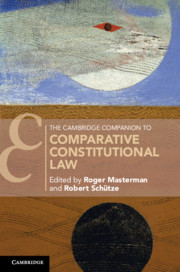Book contents
- Reviews
- The Cambridge Companion to Comparative Constitutional Law
- Cambridge Companions to Law
- The Cambridge Companion toComparative Constitutional Law
- Copyright page
- Contents
- Notes on Contributors
- Acknowledgements
- Table of Cases (Selection)
- Abbreviations
- Introduction
- Part I Theoretical Foundations
- Part II Historical Experiences
- Part III Constitutional Principles
- 8 Democracy
- 9 Separation of Powers
- 10 The Rule of Law
- 11 Human Rights Law
- 12 Federalism
- Part IV State Institutions
- Part V Transnational Constitutionalism
- Index
- References
11 - Human Rights Law
from Part III - Constitutional Principles
Published online by Cambridge University Press: 30 September 2019
- Reviews
- The Cambridge Companion to Comparative Constitutional Law
- Cambridge Companions to Law
- The Cambridge Companion toComparative Constitutional Law
- Copyright page
- Contents
- Notes on Contributors
- Acknowledgements
- Table of Cases (Selection)
- Abbreviations
- Introduction
- Part I Theoretical Foundations
- Part II Historical Experiences
- Part III Constitutional Principles
- 8 Democracy
- 9 Separation of Powers
- 10 The Rule of Law
- 11 Human Rights Law
- 12 Federalism
- Part IV State Institutions
- Part V Transnational Constitutionalism
- Index
- References
Summary
Any analysis of the role of human rights in domestic constitutional law must grapple with a central tension lying at the core of the relationship between the two. Whereas constitutional law is inevitably grounded in a particular place covering defined sets of people, human rights aspire, as the term makes clear, to transcend the political in the name of entitlements that inhere in people wherever they are from and regardless of the governmental arrangements under which they live. National constitutional law can almost always point to a specific moment when the foundational document from which all else follows is agreed and brought into effect, and even in those very few places where this is not the case (the United Kingdom, for example) the ‘constitution’ is made up of a bundle of documents (statutes; judicial decisions; shared practices) which are similarly rooted in time as well as in place and people. In this way too human rights appear different: the vast ambition of the phrase involves a claim to stand outside a history made up not only of people and places but of foundational turning points as well.
- Type
- Chapter
- Information
- The Cambridge Companion to Comparative Constitutional Law , pp. 291 - 311Publisher: Cambridge University PressPrint publication year: 2019

